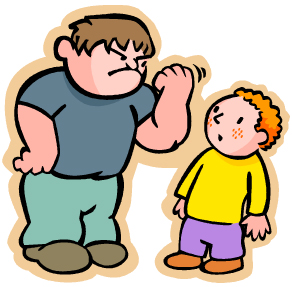Category — 2.9 Children with Mental Illness: Conduct Disorders
Children with Conduct Disorder (CD)
Children with conduct disorder are very defiant. This means they rebel against authority and engage in activities that are meant to annoy and in some cases hurt others. They say no to almost everyone.
Many children with Oppositional Defiant Disorder or ODD who do not get proper treatment end up getting diagnosed with CD when they get older. CD is a condition that is much more serious than ODD. Children with CD do not just annoy others. They hurt them physically, verbally, or both. CD usually includes the following symptoms:
- Aggressive behavior, which includes:
- Bullying and intimidating others (Fig. 1);
- Fighting with others;
- Using weapons to hurt others (like a knife, gun or bat (Fig. 2);
- Physically hurting people;
- Physically hurting animals;
Figure 1. Bulling

Figure 2. Knives
- Destroying property, which includes:
- Setting fires (Fig. 3);
- Keying cars (that is, scratching marks onto cars with keys);
- Damaging school property;
- Damaging other people’s homes (Fig. 4);

Figure 3. Fire

Figure 4. Damage
- Delinquent behavior (that is, behavior that is not socially acceptable and might be illegal), which includes:
- Breaking into people’s homes in order to hurt them or steal from them;
- Lying;
- Stealing;
- Disobeying curfews;
- Running away from home;
- Joining a gang.
Many children with CD do not perform well in school because of their behavior. Many miss a lot of school days and others drop out of school very early. Teachers can help these children in the classroom but they need help because these children can and will hurt the teacher or their classmates. With the help of the special educator, a behavioral consultant and the child’s clinical psychologist, the teacher can help the child by:
- Making sure the child knows that he or she is welcome in the classroom but that his or her behaviors and attitudes are not;
- Being very consistent because a child with CD will test the teacher to his or her limits;
- Providing them with routines and predictability;
- Watching them very carefully and stepping in the minute they realize the child is about to act out (for example, a child who fidgets and squirms in his or her seat is sending the message that he or she needs a break);
- Making sure valuable and potentially dangerous materials (like scissors) are put under lock and key;
- Giving them extra time, if needed, to turn in class and homework assignments;
- Consulting with the school’s special educator to help these children reach their maximum potential. That is because many children with CD do not perform well in school and have low grades. The special educator can help the teacher find ways to encourage these children to perform well in school;
- Many children with CD also have Attention Deficit Hyperactive Disorder or ADHD. In these cases the special educator will help the teacher rearrange the classroom in order to help a child with ADHD;
- Consulting with the school counselor: many children with CD have a low self-esteem and do not have many friends. The school counselor and teacher can work together to improve the child’s low self-esteem.
Children with CD need help from a licensed clinical psychologist. The psychotherapist will:
- Offer the child individual psychotherapy;
- Offer the child social skills training;
- Offer the child and his or her family therapy;
- Offer the child’s family advice on how they should treat their child;
- Help the child with any other condition he or she has, such as depression or anxiety.
The parents of children with CD are usually asked to take parenting classes to learn how to best raise their children. With proper and intensive psycho-therapy, many children with CD do overcome their difficulties and grow up to be happy and healthy adults (Fig. 5).

Figure 2. Happy young adult
see References
October 20, 2012 No Comments
